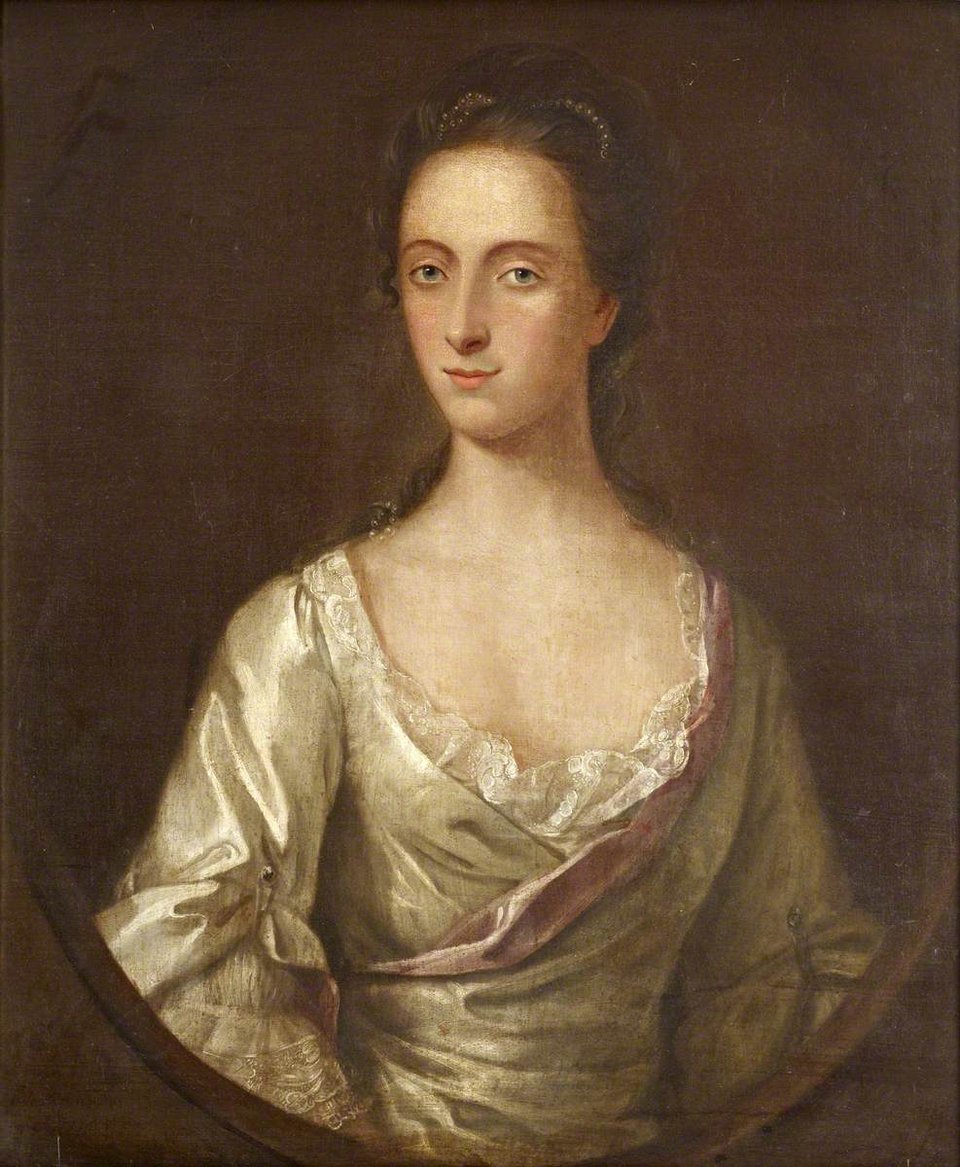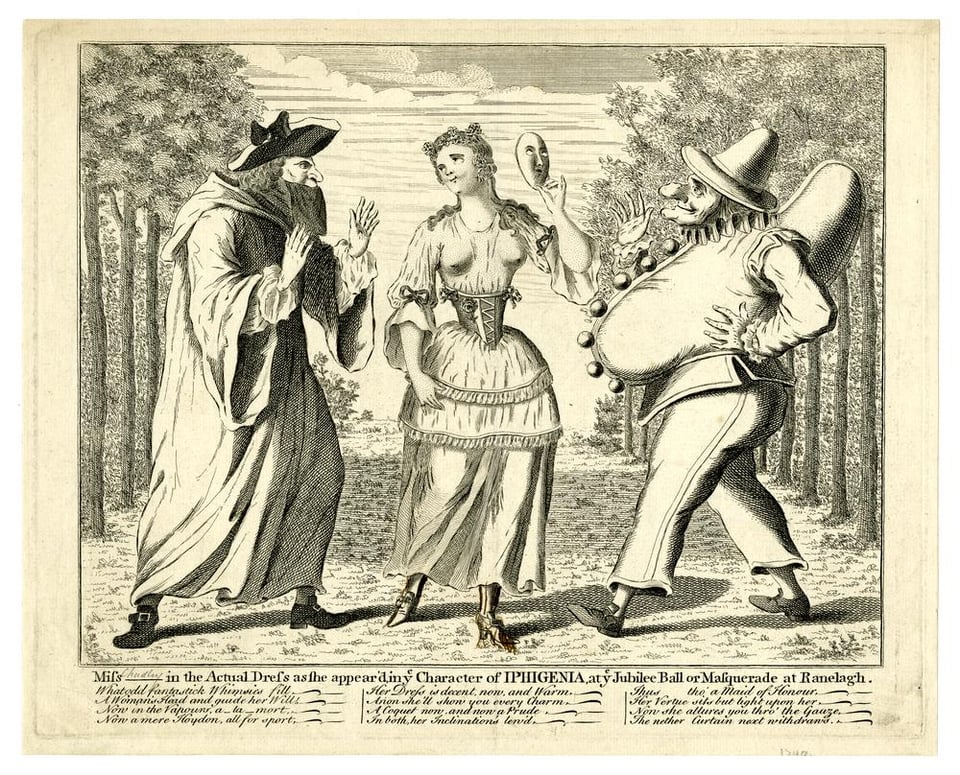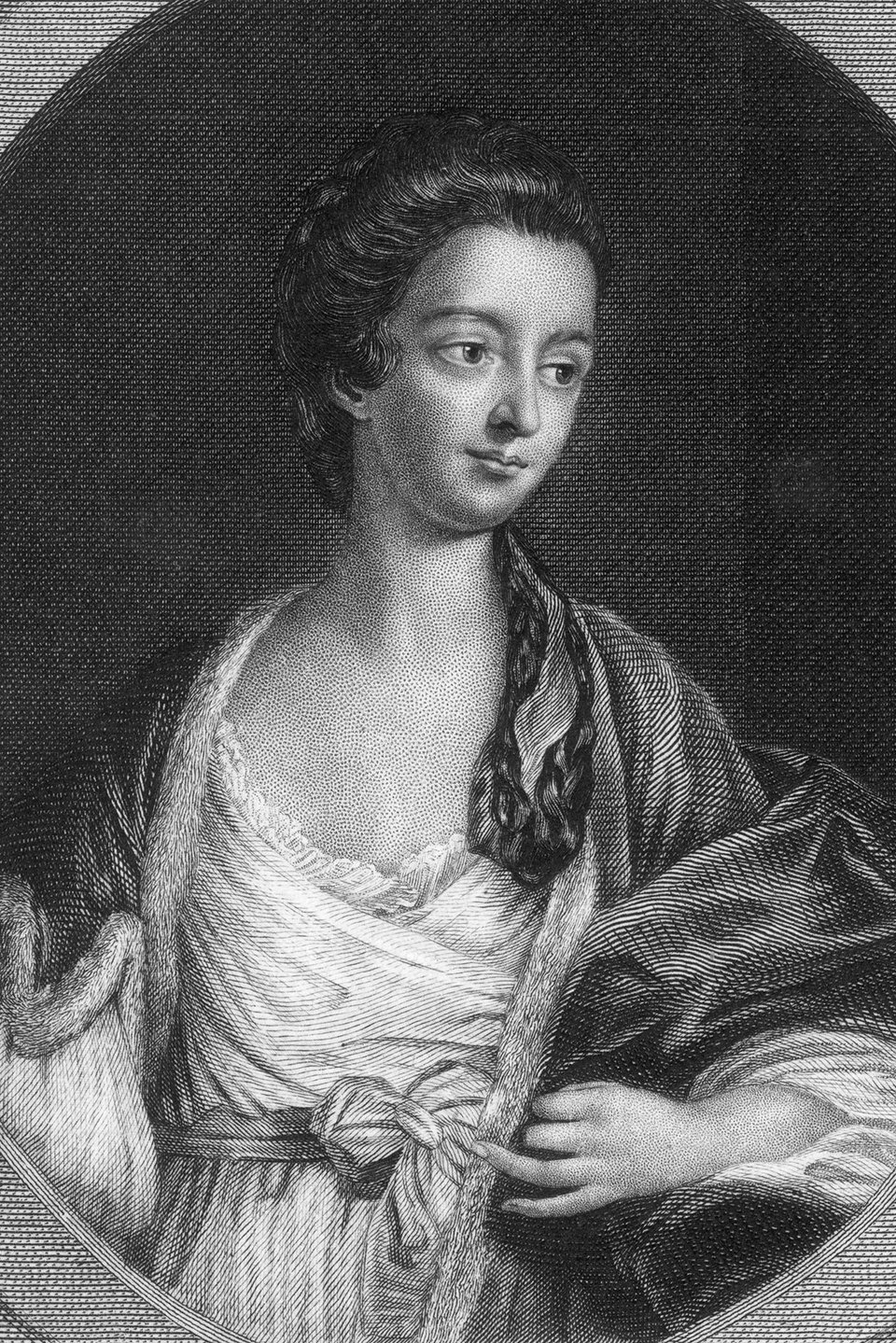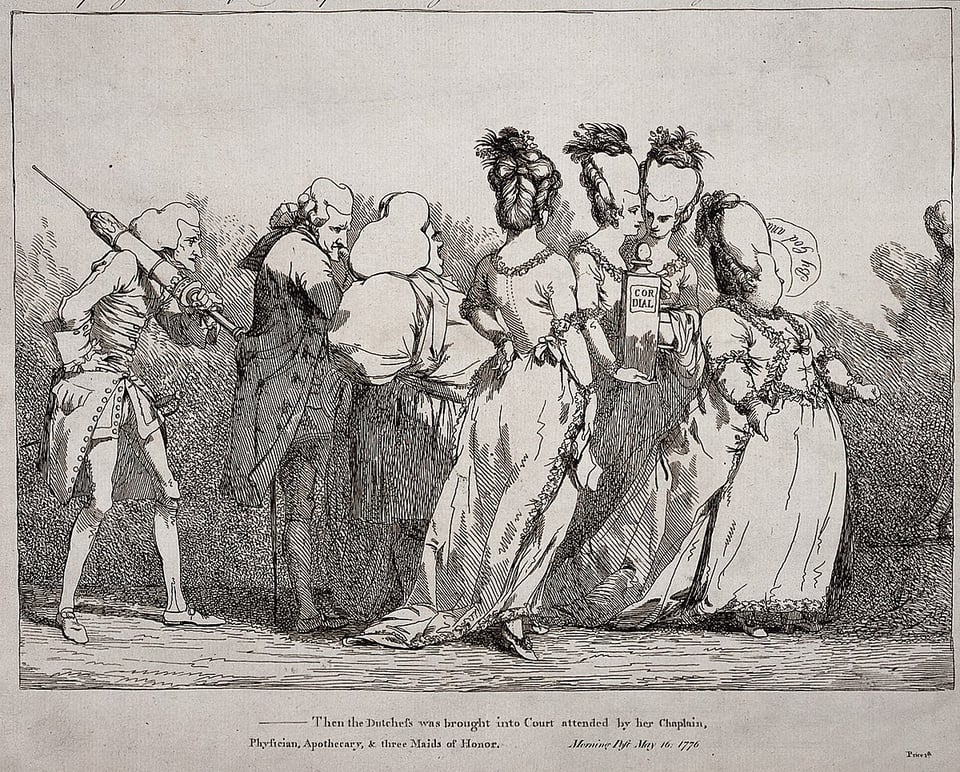She Was the Biggest Scandal in Georgian England
Thanks for reading my newsletter! If you like my writing, I have a novel coming out in August. Lessons in Magic and Disaster has gotten two starred reviews from Kirkus and Library Journal, and I’ve been so happy to see rave reviews from many early readers. It’s about a witch named Jamie who decides to teach her grief-blighted mother how to do magic. It’s about queer families, healing, and unconditional love. And it’s about a mysterious book from 1749 that holds the secrets of a long-buried scandal. You can pre-order it anywhere, but if you pre-order from Green Apple and specify in the comments field, I will sign and personalize with a doodle. And if you send me your pre-order receipt, I’ll send you a PDF with deleted All the Birds in the Sky content plus a 30,000 word glimpse of the sequel to Birds. Details here.
The “Monstrous” Elizabeth Chudleigh charmed and shocked a nation
I've been obsessed for ages with Elizabeth Chudleigh (1721-1788). An over-the-top femme who scandalized Georgian society, she was best known for showing up half-naked at a royal masque and also for being put on trial for bigamy. Of all the outrageous characters I've come across in my research on 18th century England, she's one of the most fascinating — though sadly, I was only able to sneak one mention of her into Lessons in Magic and Disaster.
So yeah — Elizabeth Chudleigh, the daughter of a fairly distinguished family, married two different men. First, she married Augustus Hervey in a secret late-night ceremony right before Hervey was due to sail back overseas. (Hervey was not particularly wealthy, but he was second in line to become Earl of Bristol if his sickly older brother died.) Augustus spent the next few years at sea, only interacting with his new wife occasionally, but sending her money to cover her debts. The two of them appear to have had a child, who died pretty quickly.
Elizabeth kept this marriage secret, because she'd become a Maid of Honour to the Princess of Wales, a position which was only open to unmarried women. Even though Augustus was giving her money, she quickly decided the marriage wasn't real, and started finding new men who could support her.
All of the men in Elizabeth's own family had died by the time she was twenty, including her father and her brother, so she saw firsthand what happened to women who didn't have a man to provide for them. Interestingly, Elizabeth's grandmother, Lady Mary Chudleigh, was an early feminist writer and compatriot of Mary Astell who wrote, among other things, an anti-marriage poem called "To The Ladies" which urges women to "Value yourselves and men despise/You must be proud, if you'll be wise."

Anyway, Elizabeth Chudleigh comes across as someone who knew how to seize the spotlight when she needed to — she was a wit who was quick, clever and provocative, one person observed at the time.
At a certain point, Augustus Hervey seems to have wised up and stopped sending her money. (She and Augustus couldn't simply get divorced, because it was nearly impossible at that time. See my earlier piece about Laetitia Pilkington.) In the absence of Augustus' support, Elizabeth needed a new sugar daddy — so she took drastic action.
In June 1749, King George II attended a masquerade at the King's Theatre, along with everybody who was anybody in Georgian England. People showed up in costume as figures from paintings, as characters from literature, and so on. And Elizabeth showed up in a state of undress that apparently left very little to the imagination. She was dressed as Iphigenia, Agamemnon's daughter, ready to be sacrificed. One onlooker said that she was "so naked, ye high Priest might easy inspect ye Entrails of ye Victim." According to one account, the Princess of Wales was so horrified, she threw a cloak over Elizabeth to cover her up, and Elizabeth supposedly remarked that "Those who have parts not fit to be seen, do well to conceal them; that is not my case." (As with a lot of things to do with Elizabeth, this is probably at least exaggerated.)

Elizabeth was instantly a huge scandal, and this could have led to her being cast out of polite society — except that King George, the man in whose honor this party was being thrown, was utterly taken with her. He walked up to her at the masquerade and asked if he could touch her breast. She replied that she could put his hand to "a far softer place" and guided his hand to the top of his own head. The king was delighted, and threw another party in her honor a few days later.
This pretty much set the pattern for the years that followed. Elizabeth was a subject of constant gossip and whispered condemnation — but she remained close to the Royal family, even into her late forties, organizing their parties and other events and entertaining every visiting ambassador. She became a pillar of London high society, even though tons of people knew about her secret marriage.

Meanwhile, she took up with Evelyn Pierrepont, the Duke of Kingston-upon-Hull, who kept her in a grand style and helped her to build her own lavish home, Chudleigh House. The two of them were inseparable for decades, and they finally wed in 1769 after an ecclesiastical court ruled that she was not already married. The Duke, a painfully shy man, attached himself to Elizabeth, the ultimate extrovert who could make social events happen.
And she never lost her gift for making a scene. In April 1754, she attended a play at the King's Theatre where it was so hot and stuffy that a few people, including one of the actors, fainted. Some of the other Maids of Honour were planning on fainting in order to attract attention — but the other maids were pre-empted by Elizabeth, who fainted so spectacularly, with so much "kicking and screaming" (according to Horace Walpole) that nobody else could possibly compete and they all had to give up.
Elizabeth and the Duke befriended John Fielding, who created an early version of the London police, and tried to attend every single hearing where a suspect was brought before the magistrate. She was the second woman ever to apply for a ticket to the reading room at the British Museum, rode a horse as a jockey in a big public race, and at one point held her own banker at gunpoint to force him to disburse some money she needed. If she grew too hot when she was in mixed company, she would fan herself with her own petticoats — and she frequently forced her guests to listen to her vomiting in the next room after dinner.
At some point, the parties Elizabeth threw for visiting ambassadors paid off and got her an invitation to visit Maria Antonia, the Electress of Saxony in what's now Germany, and she decided to go on her own, leaving the Duke behind in England. But when I say she traveled "on her own," I mean she only brought with her two female companions, an apothecary (to help her vomit), a musician, a male servant, and a Swiss "hussar" who knew his way around Germany. She traveled in a specially-built coach of her own design that cost a small fortune, including a huge trunk for all her clothes, built into the spring of the forecarriage.
While she was traveling in Germany, she stopped in Brunswick, where according to Casanova, she was asked to take part in reviewing the troops who were stationed there. It started pouring rain, and all the other ladies took shelter in tents — but Elizabeth remained outside, where her muslin dress was soaked through, revealing her body to all the soldiers in a way that apparently left little to the imagination, and she seemed not to mind. (This was in 1765, when she would have been 44 years old.)
Casanova also claimed to have accompanied Chudleigh to two separate orgiastic entertainments in Naples, one featuring a naked priest and the other featuring a dozen naked ladies in a fountain — which Elizabeth proclaimed to be rather tedious.

She almost got away with marrying the Duke of Kingston while still being legally married to Augustus Hervey. Except that she made a questionable decision — fifteen years after her first late-night marriage, she learned that the minister who performed the ceremony was going to die soon. She visited him and asked him to make an entry for the wedding in his register, in case she needed to prove later that she really had married Augustus. Y’know, just in case. (She hid in the minister's closet when the registrar showed up, but after the registrar said he needed the bride to be present, she miraculously appeared.)
Betty Rizzo, in the indispensable Companions Without Vows, speculates that "there is certainly a possibility that Chudleigh was a practicing lesbian." In her youth, she was inseparable from the "rakish" Lady Caroline Fitzroy Petersham and Elizabeth Ashe, both of whom were sporty and allegedly visited lesbian bordellos. Her whole life, Chudleigh surrounded herself with maids who were young and beautiful, dressing them in vestal white and keeping them away from male suitors. That said, she apparently treated the young women around her, her maids and companions, monstrously. Rizzo includes a ton of horrifying stories about Chudleigh's selfishness and abusive behavior.
Marrying the Duke seems to have backfired for Elizabeth — society ladies stopped visiting her once they had to call her Your Grace, and society balked at actual bigamy.
In any case, she only faced a serious trial for bigamy after the Duke had died. She escaped being burned alive, because she was now the wife of an Earl (Augustus). And she managed to flee to Europe mere hours before she would have received an order banning her from leaving England. For the rest of her life, a dozen years, she roamed around Europe, being lavishly received by nobles and heads of state.
Late in life, Elizabeth produced a short memoir (though its authorship is disputed), in which she says, "I would hate myself if I remained more than one hour in a tone of mind."
As Rizzo writes, it's tempting to view Elizabeth Chudleigh as a feminist icon for flouting convention and getting away with some pretty extreme behavior. But she became "a monstrous parody of male prerogative in her cruel determination to regard nothing but her own will, pleasure and power." Where is my prestige TV show about this woman?
(Sources: besides Rizzo's book, I relied on Elizabeth: The Scandalous Life of an Eighteenth-Century Duchess by Claire Gervat. I only just realized there's a new biography of Chudleigh called The Duchess Countess, which has apparently caused a big splash in the U.K., but I haven't read that one yet.)
Music I Love Right Now
Estelle is probably best known for a couple of things: she had a big hit years ago called “American Boy” with Kanye West. And she was the voice of Garnet on Steven Universe.
But her new album, Stay Alta, is incredible and I need everyone to listen to it right now. Here’s a taste:
Stay Alta feels very disco-influenced to me, but also fresh as hell. The lyrics are uplifting and joyful, the beats propulsive and driven by a nice thumping bass. “Like He Is” is a riff on an old Stevie Wonder/Syreeta song that takes it in a new direction. I’ve been waiting months for this album, since Estelle put out a handful of killer songs earlier this year, and it’s living up to my highest expectations. This is music that will fill you with energy and positivity, during a time when we all desperately need more life. One of my favorite albums in ages.